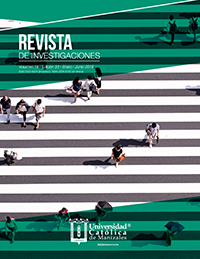The Argumentation
A Strategy To Learn The Concept Of Chemical Bond
DOI:
https://doi.org/10.22383/ri.v19i33.122Keywords:
argumentation, argumentative levels, conceptual models, learningAbstract
Objective: to describe the argumentative levels that support students’ conceptual models on the topic of chemical bond. Methodology: the research proposal is based on a qualitative descriptive approach, along with a qualitative analysis. A questionnaire applied to25 students of an urban-public school in the city of Manizales, Caldas, Colombia was the instrument used for the data collection process at the beginning and at the end of the didactic intervention supported in the development of argumentative processes. Findings: the highest argumentative levels are related to school conceptual models, which are close to the scientific models. Conclusion: When implementing the strategies that fostered the argumentation in class, a proportional relation in the complexity of the arguments built by the students, was generated, identifying gradual changes in the progress of both aspects.
References
Berland, L. & McNeill, K. (2010). A learning progression form scientific argumentation: understanding student work and designing supportive instrutional contexts. Recuperado de Wiley Online Library: http://www.wileyonlinelibrary.com
https://doi.org/10.1002/sce.20402
Bravo, B., Puig, B. y Jiménez-Aleixandre, M. d. (2009). Competencias en el uso de pruebas en argumentación. Recuperado de ResearchGate: http://www.researchgate.net/publication/273138625
https://doi.org/10.1016/S0187-893X(18)30020-X
Campaner, G. y De Longhi, A. (s.f.). Enseñar a argumentar. Un aporte a la didáctica de las ciencias. En Tercer Encuentro de Investigadores en Didáctica de la Biología. Buenos Aires.
Campaner, G. y De Longhi, A. L. (2007). La argumentación en Educación Ambiental. Una estratégia didáctica para la escuela media. Revista electrónica de enseñanza de las Ciencias, 442-456.
Custodio, E., Márquez, C. y Sanmartí, N. (2015). Aprender a justificar científicamente a partir del estudio del origen de los seres vivos. Investigaciones didácticas, 133-155.
https://doi.org/10.5565/rev/ensciencias.1316
De Posada, J. (1999). Concepciones de los alumnos concepciones de los alumnos antes, durante y después de la enseñanza formal. problemas de aprendizaje. Investigación didáctica, 227-245.
https://doi.org/10.5565/rev/ensciencias.4088
Fowler, T. D. (2006). A Threshold Model of Content Knowledge Transfer for Socioscientific Argumentation. Sci. Ed., (90), 986-1004. doi: http://doi.org/10.1002/sce.20165
https://doi.org/10.1002/sce.20165
Henao, B. L. y Stipcich, M. S. (2008). Educación en ciencias y argumentación: la perspectiva de Toulmin como posible respuesta a las demandas y dsafíos contemporáneos para la enseñanza de las Ciencias Experimentales. Revista electrónica de enseñanza de las ciencias, 47-62.
Jiménez-Aleixandre, M. y Díaz, J. (2003). Discurso de aula y argumentacón en la clase de ciencias: cuestiones teóricas y metodológicas. Investigación didáctica, 359-370.
https://doi.org/10.5565/rev/ensciencias.3914
Ministerio de Educación Nacional [MEN]. (1996). Resolución 2343 de junio 5 de 1996. Por la cual se adopta un diseño de lineamientos generales de los procesos curriculares del servicio público educativo y se establecen los indicadores de logros curriculares para la educación formal. Bogotá: MEN.
MEN. (2006). Estándares básicos de competencias. Bogotá: autor.
MEN. (s.f.). Derechos básicos de aprendizaje. Bogotá: autor.
Moreira, M., Greca, I. y Palmero, M. (2002). Modelos mentales y modelos conceptuales en la enseñanza & aprendizaje de las ciencias. Revista Brasileira de Pesquisa em Educação em Ciências, 2(3), 37-57.
Nielsen, J. A. (2011). Dialectical features of students'argumentation: a critical review of argumentation studies in science education. Res Sci Educ, 371-393.
https://doi.org/10.1007/s11165-011-9266-x
Peterson, R. & Treagust, D. (1989). Misconceptions of covalent bond and structure. Journal of Chemical Education, 459-460.
https://doi.org/10.1021/ed066p459
Peterson, R., Treagust, D. & Garnett, P. (1989). Development and application of a diagnostic instrument to evaluate grade-11 and -12 students' concepts of covalent bonding and structure following a course of instruction. Journal of research in science teaching, 301-314.
https://doi.org/10.1002/tea.3660260404
Revel Chion, A., Couló, A., Erduran, S., Furman, M., Iglesia, P. y Adúriz-Bravo, A. (2005). Estudios sobre la enseñanza de la argumentación científica escolar. Enseñanza de las ciencias, 1-5.
Rincón, L. (2005). Enlace Químico. Mérida, Venezuela: Universidad de los Andes.
Ruiz, F. (2012). Caracterización y evolución de los modelos de enseñanza de la argumentación en clases de ciencias en la educación primaria. (Tesis doctoral). Universitat Autónoma de Barcelona, Barcelona, España.
Ruiz, F., Tamayo, O. y Márquez, C. (2012). Los episodios argumentativos y las preguntas, como indicadores de procesos argumentativos en ciencias. EDUCyT, 229-244.
Ruiz, F., Tamayo, O. y Márquez, C. (2015). La argumentación en clase de ciencias, un modelo para su enseñanza. Educacao e Pesquisa, 629-645.
https://doi.org/10.1590/S1517-9702201507129480
Sarda, A. (2005). Enseñando a argumentar en torno a la educación ambiental. Educar, 17-26.
Sarda, A. y Sanmartí, N. (2000). Enseñar a argumentar científicamente: un reto de las clases de ciencias. Investigación didáctica, 405-422.
https://doi.org/10.5565/rev/ensciencias.4028
Simon, S., Erduran, S. & Osborne, J. (2006). Learning to teach argumentation: Research and development in the science classroom. International Journal of science education, 235-260.
Published
How to Cite
Issue
Section
License
Copyright (c) 2019 Revista de Investigaciones · UCM

This work is licensed under a Creative Commons Attribution-NonCommercial 4.0 International License.
Attribution — You must give appropriate credit, provide a link to the license, and indicate if changes were made. You may do so in any reasonable manner, but not in any way that suggests the licensor endorses you or your use.
NonCommercial — You may not use the material for commercial purposes.
This work is licensed under a Creative Commons Attribution-NonCommercial 4.0 International License.












